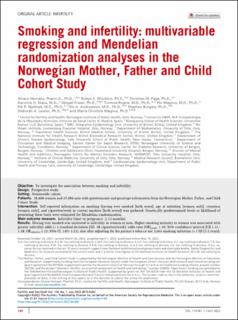Smoking and infertility: multivariable regression and Mendelian randomization analyses in the Norwegian Mother, Father and Child Cohort Study
| dc.contributor.author | Hernáez, Álvaro | |
| dc.contributor.author | Wootton, Robyn E | |
| dc.contributor.author | Page, Christian Magnus | |
| dc.contributor.author | Skåra, Karoline Hansen | |
| dc.contributor.author | Fraser, Abigail | |
| dc.contributor.author | Rogne, Tormod | |
| dc.contributor.author | Magnus, Per Minor | |
| dc.contributor.author | Njølstad, Pål Rasmus | |
| dc.contributor.author | Andreassen, Ole | |
| dc.contributor.author | Burgess, Stephen | |
| dc.contributor.author | Lawlor, Deborah A. | |
| dc.contributor.author | Magnus, Maria Christine | |
| dc.date.accessioned | 2022-06-29T06:42:58Z | |
| dc.date.available | 2022-06-29T06:42:58Z | |
| dc.date.created | 2022-06-21T15:14:34Z | |
| dc.date.issued | 2022 | |
| dc.identifier.issn | 0015-0282 | |
| dc.identifier.uri | https://hdl.handle.net/11250/3001421 | |
| dc.description.abstract | Objective To investigate the association between smoking and infertility. Design Prospective study. Setting Nationwide cohort. Patients 28,606 women and 27,096 men with questionnaire and genotype information from the Norwegian Mother, Father, and Child Cohort Study. Intervention Self-reported information on smoking (having ever smoked [both sexes], age at initiation [women only], cessation [women only], and cigarettes/week in current smokers [both sexes]) was gathered. Genetically predetermined levels or likelihood of presenting these traits were estimated for Mendelian randomization. Main outcome measure Infertility (time-to-pregnancy ≥12 months). Results Having ever smoked was unrelated to infertility in women or men. Higher smoking intensity in women was associated with greater infertility odds (+1 standard deviation [SD, 48 cigarettes/week]: odds ratio [OR]crude, 1.19; 95% confidence interval [CI] 1.11–1.28; ORadjusted 1.12; 95% CI, 1.03–1.21), also after adjusting for the partner’s tobacco use. Later smoking initiation (+1 SD [3.2 years]: ORcrude, 0.94; 95% CI, 0.88–0.99; ORadjusted 0.89; 95% CI, 0.84–0.95) and smoking cessation (vs. not quitting: ORcrude, 0.83; 95% CI, 0.75–0.91; ORadjusted, 0.83; 95% CI, 0.75–0.93) were linked to decreased infertility in women. Nevertheless, Mendelian randomization results were not directionally consistent for smoking intensity and cessation and were estimated imprecisely in the 2-sample approach. In men, greater smoking intensity was not robustly associated with infertility in multivariable regression and Mendelian randomization. Conclusions We did not find robust evidence of an effect of smoking on infertility. This may be due to a true lack of effect, weak genetic instruments, or other kinds of confounding. | en_US |
| dc.language.iso | eng | en_US |
| dc.publisher | Elsevier | en_US |
| dc.rights | Navngivelse 4.0 Internasjonal | * |
| dc.rights.uri | http://creativecommons.org/licenses/by/4.0/deed.no | * |
| dc.title | Smoking and infertility: multivariable regression and Mendelian randomization analyses in the Norwegian Mother, Father and Child Cohort Study | en_US |
| dc.type | Journal article | en_US |
| dc.type | Peer reviewed | en_US |
| dc.description.version | publishedVersion | en_US |
| dc.rights.holder | Copyright 2022 The Authors | en_US |
| cristin.ispublished | true | |
| cristin.fulltext | original | |
| cristin.qualitycode | 1 | |
| dc.identifier.doi | 10.1016/j.fertnstert.2022.04.001 | |
| dc.identifier.cristin | 2033947 | |
| dc.source.journal | Fertility and Sterility | en_US |
| dc.source.pagenumber | 180-190 | en_US |
| dc.identifier.citation | Fertility and Sterility. 2022, 118 (1), 180-190. | en_US |
| dc.source.volume | 118 | en_US |
| dc.source.issue | 1 | en_US |
Files in this item
This item appears in the following Collection(s)
-
Department of Clinical Science [2292]
-
Registrations from Cristin [9487]

